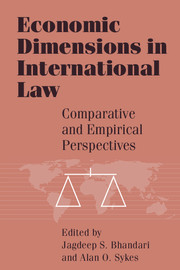Book contents
- Frontmatter
- Contents
- Preface
- Introduction: Economics and international law
- 1 The economics of the most favored nation clause
- 2 The economics of “injury” in antidumping and countervailing duty cases
- 3 The economics of “injury” in antidumping and countervailing duty cases: A reply to Professor Sykes
- 4 Innovations in support of the unitary injury test in U.S. unfair trade cases
- 5 The free trade–fair trade debate: Trade, labor, and the environment
- 6 International conflict and coordination in environmental policies
- 7 Market modernization of law: Economic development through decentralized law
- 8 Toward a positive theory of privatization: Lessons from Soviet-type economies
- 9 New stories on exchange rate policies in transition
- 10 Is deposit insurance inevitable? – lessons from Argentina
- 11 The market for migrants
- 12 The interplay of liquidation and reorganization in the bankruptcy systems of Canada and the United States: The role of screens, gatekeepers, and guillotines
- 13 International political economy approaches to international institutions
- 14 The trade effects of domestic antitrust enforcement
- 15 The Hartford Insurance Company case: Antitrust in the global economy – welfare effects and sovereignty
- 16 Recognition of foreign judgments as a trade law issue: The economics of private international law
- 17 Externalities and extraterritoriality: The law and economics of prescriptive jurisdiction
- Index
11 - The market for migrants
Published online by Cambridge University Press: 05 December 2011
- Frontmatter
- Contents
- Preface
- Introduction: Economics and international law
- 1 The economics of the most favored nation clause
- 2 The economics of “injury” in antidumping and countervailing duty cases
- 3 The economics of “injury” in antidumping and countervailing duty cases: A reply to Professor Sykes
- 4 Innovations in support of the unitary injury test in U.S. unfair trade cases
- 5 The free trade–fair trade debate: Trade, labor, and the environment
- 6 International conflict and coordination in environmental policies
- 7 Market modernization of law: Economic development through decentralized law
- 8 Toward a positive theory of privatization: Lessons from Soviet-type economies
- 9 New stories on exchange rate policies in transition
- 10 Is deposit insurance inevitable? – lessons from Argentina
- 11 The market for migrants
- 12 The interplay of liquidation and reorganization in the bankruptcy systems of Canada and the United States: The role of screens, gatekeepers, and guillotines
- 13 International political economy approaches to international institutions
- 14 The trade effects of domestic antitrust enforcement
- 15 The Hartford Insurance Company case: Antitrust in the global economy – welfare effects and sovereignty
- 16 Recognition of foreign judgments as a trade law issue: The economics of private international law
- 17 Externalities and extraterritoriality: The law and economics of prescriptive jurisdiction
- Index
Summary
One of the most important kinds of international trade is the trade in people that occurs when states compete for immigrants. Valuable immigrants confer great benefits on immigration state natives, and impose costs on emigration state natives. For value-decreasing immigrants, the direction of the wealth transfer is reversed. Because of this, both immigration and emigration states have a strong incentive to compete for valuable immigrants.
Too little attention has been paid to the market for migrants in the current debate over American immigration policy. Immigration opponents have argued for sharp reductions in the number of immigrants, and immigration advocates have argued for open borders. What is often missing from both sides is an acknowledgment that some immigrants are value-increasing, and some not, and that the goal of immigration policies should be to attract the former and repel the latter. In this respect, the United States has fared less well in the market for migrants than rival immigration states such as Canada.
This chapter argues that the United States should compete more effectively in the market for migrants. It should widen its doors to valuable immigrants, and close them to value-decreasing ones. Current proposals to cut welfare benefits to recent immigrants might usefully deter unwanted immigrants, but do not closely address the need to attract valuable immigrants. To do this, the United States should emulate Canada's immigration screening program. Under the Canadian “points” system, economic and some family preference immigrants are screened for the economic benefits they will confer on their host country.
- Type
- Chapter
- Information
- Economic Dimensions in International LawComparative and Empirical Perspectives, pp. 405 - 448Publisher: Cambridge University PressPrint publication year: 1998



